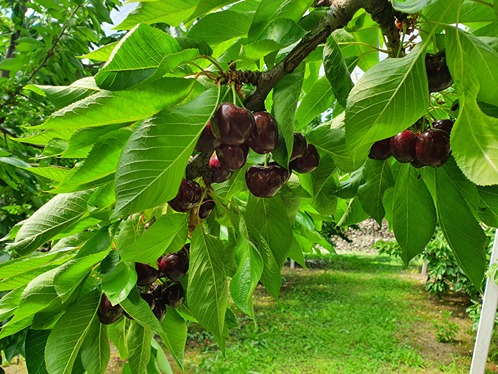The appearance of the famous cherries grown in the Jerte Valley, in the Spanish region of Extremadura, in markets and stores is a sweet synonym for the arrival of summer. This fruit has a rather short season: from May to July. This year, the "mid-harvest" day, June 1st, was chosen for the 14th fair of the picota cherry, which was held in Jerte.
The picota is a variety of cherry cultivated since the 17th century and has its own protected origin label, Cereza (cherry in Spanish) from Jerte. A local saying goes: "A picota is always a 'cereza', but a 'cereza' is not always a picota." Picota is the name used for four varieties of cherries grown from Prunus avium in the mountain valleys of Jerte, Ambroz, and La Vera, in the northern province of Cáceres, in nearby Andalusia, Extremadura.
Entering the valley, the road is lined with cherry trees whose branches are abundantly laden with deep purple fruits. In the valley, there are more than 3,700 registered cherry-growing companies, whose orchards cover an area of about 10,000 hectares.
"I would say that there are few Spanish fruits that are as adored and admired as the picota. The picotas can be grown in one of the four traditional varieties: Amburnés, Pico Limón Negro, Pico Negro, and Pico Colorado. The picota cherry is protected by a Designation of Origin (DO) certificate, which grants it Protected Designation of Origin (PDO) status within the EU."
"To use the picota designation, the cherries must be grown and packaged within a specific geographical area that includes farms in the Jerte Valley, farms above 500 meters in the La Vera District, and farms above 600 meters in the Ambroz Valley."
"The fruits are grown by hand on fertile land irrigated by crystal-clear streams. The picota is easily identifiable because its stems remain on the trees when harvested," farmer Ricardo told SUR in English.
The picotas are layered by hand in traditional chestnut wood baskets and are not subjected to any post-harvest treatment that could alter their natural goodness. From the orchards, the picotas are delivered to cooperatives. One of these is Dadifruit, located in Navaconcejo. SUR in English was invited to observe the post-harvest processing of the cherries, from washing to sorting and packaging.
Much of this "Spanish treasure" is sent abroad. About 40% of picota production is exported, with the main markets being Germany and the United Kingdom. Reportedly, sales in the UK peaked in 2011, with 10 million baskets (2,500 tons) sold in a five-week season.
Source: SUR in English
Image: SUR in English
Cherry Times - All rights reserved










